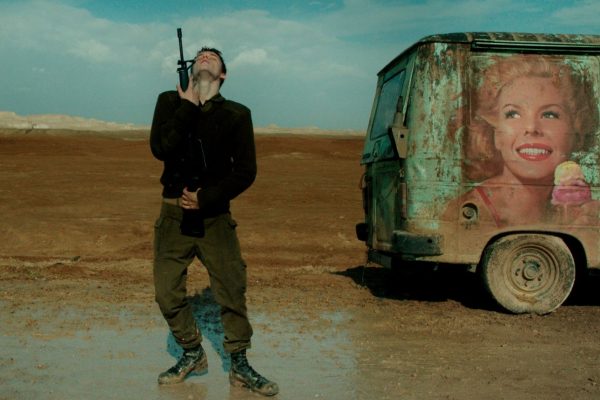@Filmhouse, Edinburgh from Fri 29 Mar 2019
Samuel Maoz is best known for his explosive drama Lebanon, an intense anti-war film which takes place entirely within the confines of a Centurion tank. His follow-up, the brilliant family drama Foxtrot is just as claustrophobic in its own way. Like its predecessor, it’s attracted bouquets from enraptured cinema audiences, and brickbats from an outraged Israeli army.
Foxtrot ingeniously splits a normal three-act structure into a triptych, each focusing on a different member of the Feldmann family; father, son and mother. Maoz changes his approach, and almost the genre in which he’s working, with each one. The overriding arc is about the devastating consequences of one’s mistakes and the violent ripple effects they can cause.
The first part sees patriarch Michael (Lior Askenazi, looking like Steve Carrell at his most sad-eyed and silver-foxy) instantly broken by a shocking bureaucratic visit from the army regarding his son. The second act plays like a surrealist tragi-comedy, rich in the kind of wry, idiosyncratic tableaux beloved of Roy Andersson as son Jonathan (Yonaton Shiray) and three colleagues man a remote outpost, idling away time by harassing Palestinian vehicles crossing the border. The third sees mother Dafna (Sarah Adler) struggling to cope with an unfathomable tragedy and comes across as an empathetic and sad chamber piece that brings to mind Bergman’s Scenes from a Marriage.
The three differing approaches and disorientating tilts in tone between sections is a masterstroke in establishing not just the perspectives, but the characters of the Feldmann family. With time limited for each it’s daring storytelling shorthand and helps them pop from the screen as rounded, flawed and completely human. Beyond the narrative spine there are little moments that link the acts Three Colors style, one of these being the foxtrot itself.
The central metaphor of the titular dance is not perhaps the most subtle, but is beautifully illustrated through the three sections. “We end up in the same place,” goes the refrain but each person performs it with their own individual variances; to eye-popping effect in the case of a bored soldier. It’s the universal experiences embedded in exacting specificity that make Foxtrot such a special experience. In a film laced with such a bitter streak of tragedy it can clumsily be seen as a spin on Tolstoy‘s maxim that every unhappy family is unhappy in their own way, but Maoz seems to offer a glimmer of potential for healing.
Maoz has crafted a film in which its influences can be spotted threaded through its canvas, but which very much has its own identity. Foxtrot is both incredibly ambitious and self-contained and intimate. It’s highly unlikely there will be many better films this year.
